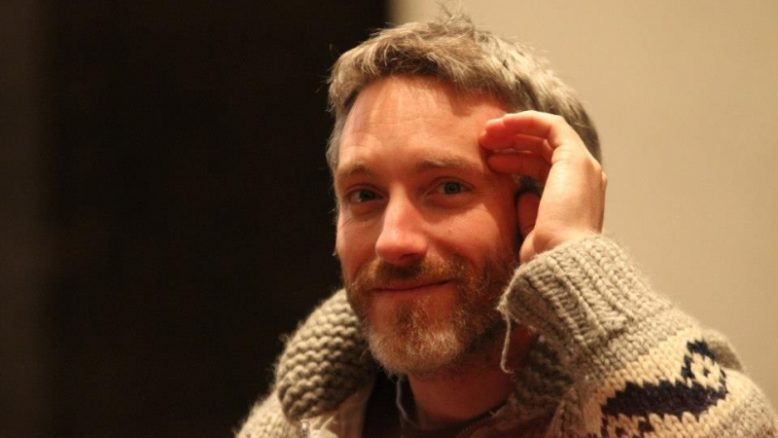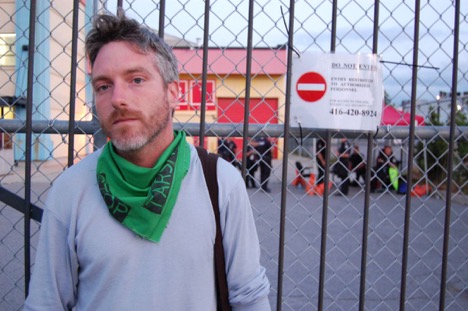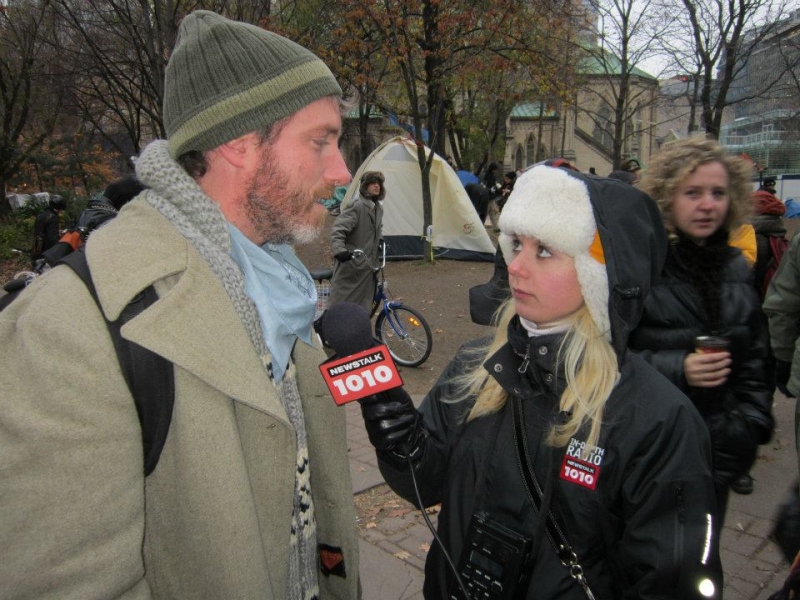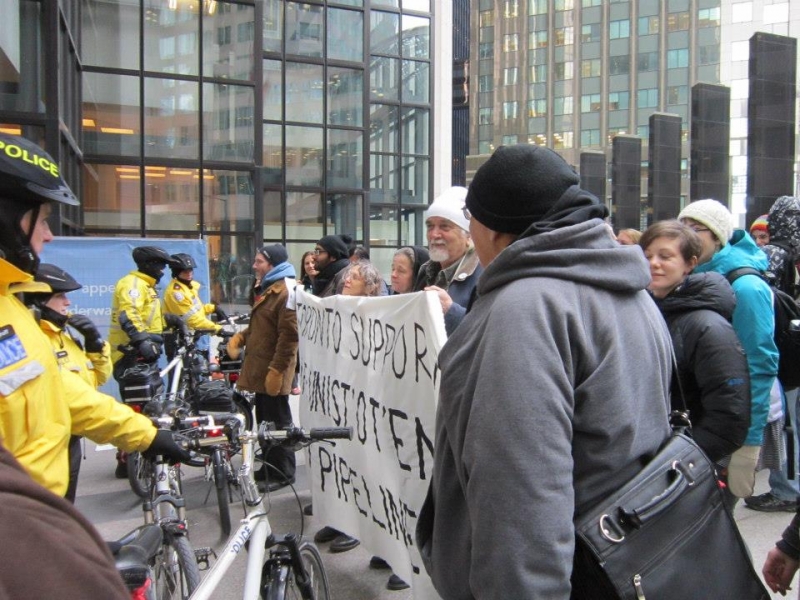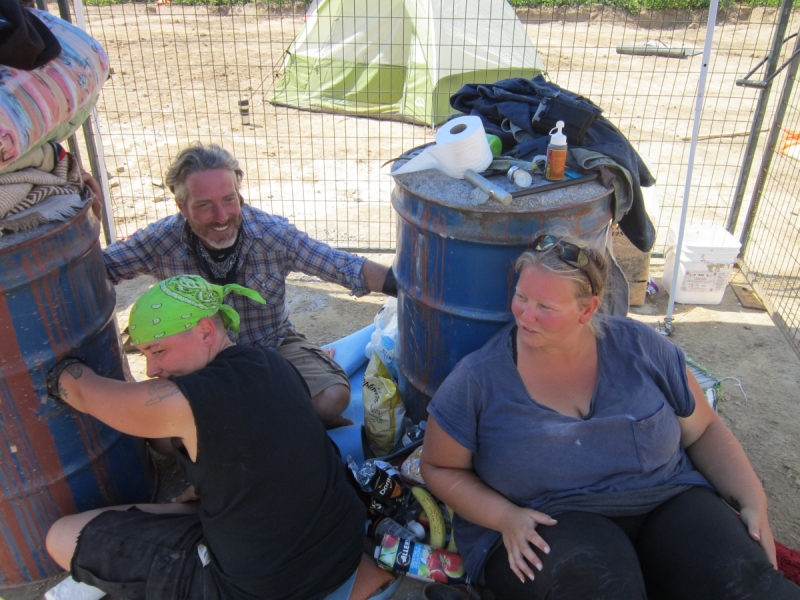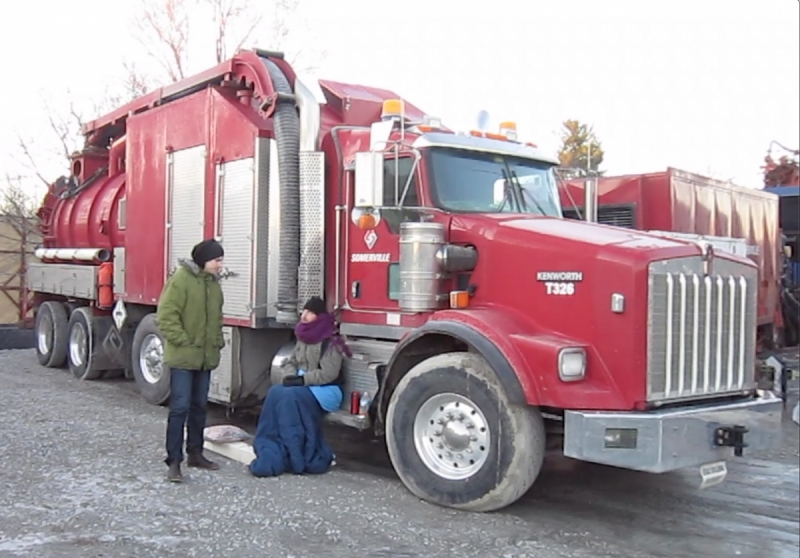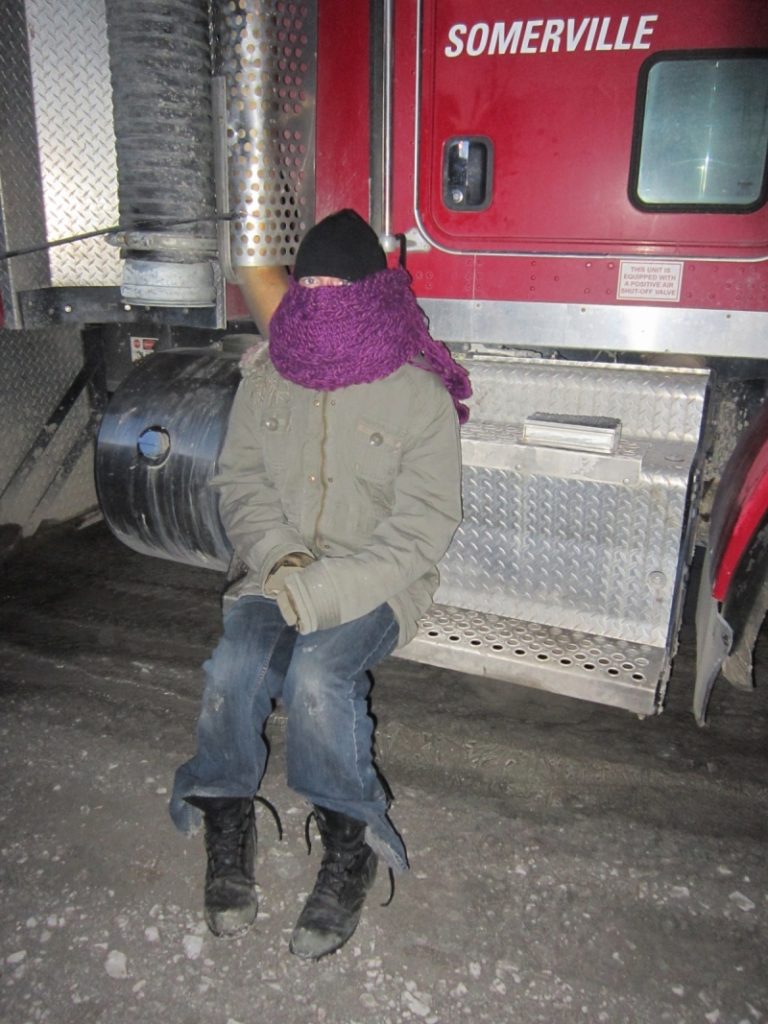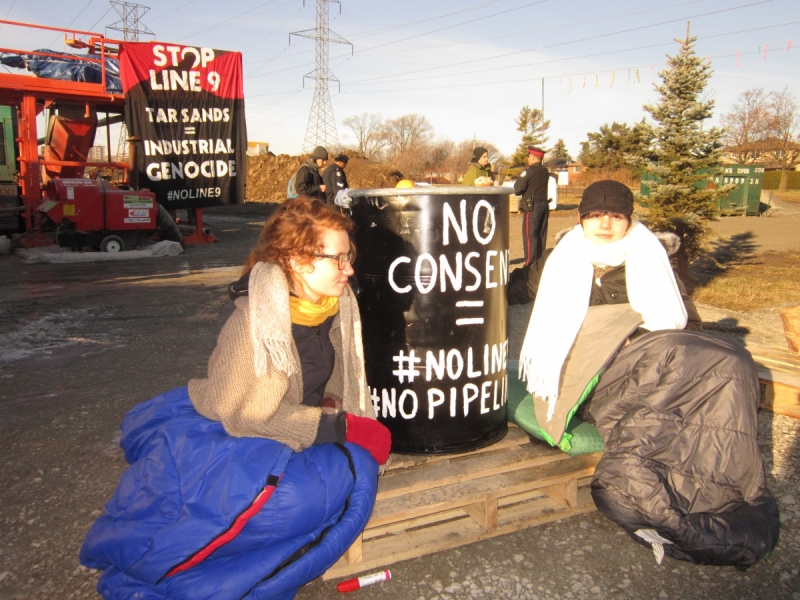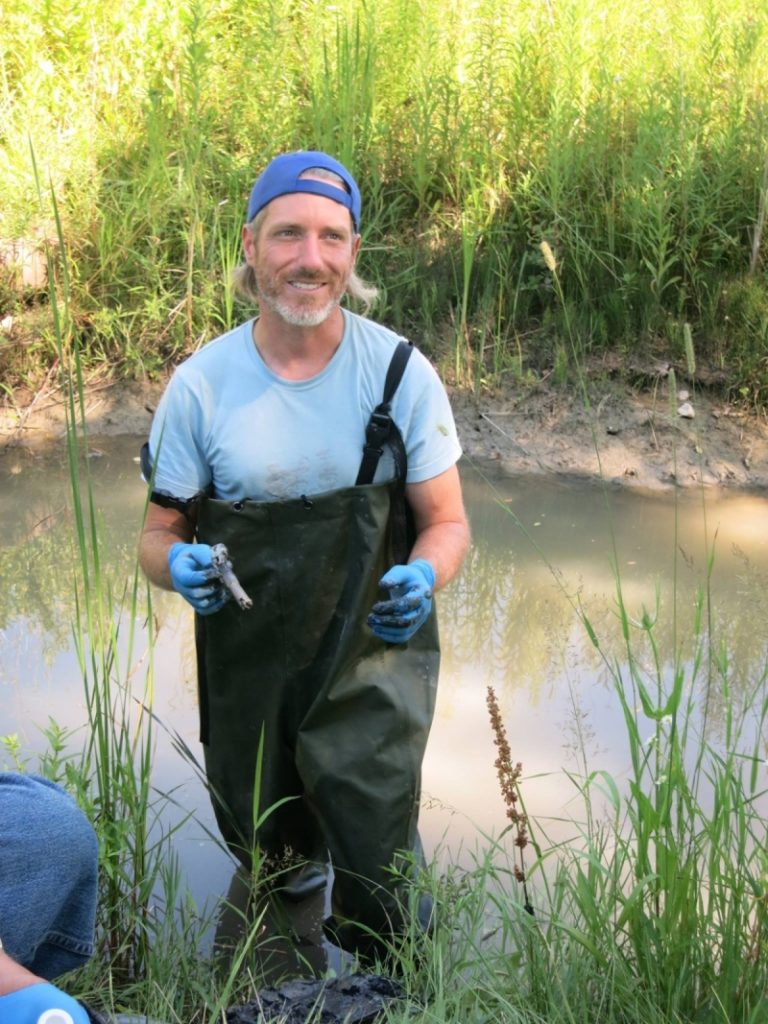From Upping the Anti
We are members of Rising Tide Toronto, a grassroots group dedicated to Indigenous solidarity work in Toronto. It has taken us a while to write something about one of our members, Dave Vasey, because in addition to being our co-organizer and co-conspirator, he was also our friend. We are still devastated by his sudden death in January 2019. Today Dave would have turned 41 years old. On this occasion we want to reflect upon his contributions to our collective movements and mourn his passing.
Dave founded Rising Tide Toronto at the end of 2012, as a reincarnation of a previous group he had organized with – Environmental Justice Toronto. That group had organized against the mining of tar sands and ran an anti-Royal Bank of Canada campaign to get the bank to divest from funding the tar sands mega project. Before that group, some of the same members organized through Rainforest Action Network Toronto. In 2009, that group along with others caused a ruckus in Parliament, demanding the government support the UN Declaration on the Rights of Indigenous Peoples and Bill C-311, the Climate Change Accountability Act. Five of them were dragged out and arrested, including Dave.
Around that time Dave had also been organizing around Canadian mining issues and co-founded Mining Injustice Solidarity Network. He did Indigenous solidarity work to help with anti-tar sands organizing in Edmonton and Fort Chipewyan, he organized against the 2010 Olympics in Vancouver, and regularly supported land defense struggles in Six Nations of the Grand River and Grassy Narrows First Nation. Dave was famously the first person to get arrested during the G20 in Toronto over a new secret fence law (in his own words on Democracy Now), and organized the Indigenous Sovereignty and Solidarity march during the week of protests.
Dave was a key participant of Occupy Toronto which started on October 15, 2011. He helped organize the first march and immediately moved into the park, living there for the full 40 days until eviction. He helped organize weekly actions, held trainings for new activists, and did many night shifts as a park marshal to try to keep the newly-formed community safe.
Soon after Occupy had ended (with events and rallies continuing for a year), he decided to start a new group called Rising Tide Toronto. In his call-out to start the group, he wanted the organization to focus on Indigenous Rights and environmental justice. And that’s what the focus of our group has continued to be to this day.
Rising Tide Toronto began with an action in support of the Unist’ot’en Camp at the end of 2012, quickly followed by an extensive No Line 9 campaign beginning in 2013. It was Dave who suggested and planned a coalition meeting to begin serious organizing in Toronto to oppose the local tar sands pipeline. He helped initiate the first gathering of activists in Aamjiwnaang/Sarnia to develop a plan to stop the reversal of the very old, regular crude pipeline that was set to carry tar sands dilbit from Sarnia to Montreal. Activists came from all over southern Ontario, leading to a vast coalition of grassroots groups working together to do our part in stopping the expansion of the tar sands megaproject.
Together with groups in Hamilton, Guelph, Kitchener-Waterloo, and London, we organized ten direct actions on Enbridge work sites, most of them during “Integrity Digs” that would apparently make the pipeline safe to carry the much heavier tar sands substance. Two of our blockades were seven days long. At the end of the second one called “Dam Line 9” Dave, along with another dedicated activist, locked himself to a barrel which was filled with cement to make it difficult for cops to remove him from the site. The police had to bring in a swat team which took several hours to jack hammer Dave and the other activist out of the barrel contraption. They and others were thrown into jail overnight with no bed, no blanket, and no food. In the end, he and the others only got conditional sentences.
That was not the only time Dave put his body on the line to stop this pipeline project which would aid in exporting tar sands overseas. At one of our several one-day blockades in Toronto, Dave bike-locked his neck to a giant construction truck at 5am on a cold December day, staying stationary there until the late afternoon.
Dave never hesitated to put his body on the line for Indigenous Rights, which was the main motivation for a lot of his activism. Where he got this bravery, we do not know. It must have come from a deep sense of responsibility as a white settler living on Indigenous lands, wanting to do his part in helping to bring about a process of decolonization. He had seen the tar sands first hand and was intimately aware of the horrific impacts on the surrounding Indigenous communities: destruction of the land, high rates of cancer, loss of traditional ways of life. As we had painted on one of our large banners that we hung up at blockades: Tar Sands is Industrial Genocide.
Dave was angered by environmental racism in this country. He knew that the tar sands and other industrial projects that pollute the land and poison the people would not be allowed to operate in white communities. Another explicit case of this is the Chemical Valley in Sarnia, which surrounds Aamjiwnaang First Nation. Dave helped organize numerous actions in support of the youth who are raising awareness about the health impacts on members of Aamjiwnaang. We travelled there many times to help with their toxic tours, water gatherings, actions, blockades, and to assist with a community water sampling project. Dave was even planning to do a PhD on Aamjiwnaang and the impact the 60+ high emitting facilities polluting the air and water, poisoning the people of this community.
Dave went on to organize yearly climate assemblies with the Toronto People’s Assembly on Climate Justice (which he also started) to bring the many social justice issues together and help educate the wider public about the climate catastrophe and its connection to racism, poverty,colonialism, class, and patriarchy.
In the last few years of his life, he worked closely with anti-rascist and anti-fascist groups, putting a lot of time and energy into disrupting fascist gatherings. Again, he would put his body on the line to stand up to fascist groups who thought they could openly parade down the streets of our city. Dave and many others showed them that they could not.
It was a sacrifice. Dave got arrested and charged several times for yelling at and fighting against neo-nazis at their hate rallies. One of the last actions he helped organize was one against a Steve Banon speaking event. He and fellow arrestees were treated particularly brutally while in custody for that. He was facing charges of mischief under $5000.
Dave regularly provided jail support and court support for his comrades. He went above and beyond to show folks being criminalized for their activism that they were remembered and appreciated.
It’s important to convey that Dave’s concerns were not limited to anti-facsism, Indigenous Rights, and climate. He supported all social justice initiatives and tirelessly worked with a wide range of groups on a myriad of issues. He supported labour struggles, the anti-nuclear movement (organizing against the dumping of nuclear waste near the Great Lakes), the Toronto Social Forum, and so many other initiatives. Dave volunteered with the Toronto Seed Library and in the spring and summer of 2018 worked tirelessly to improve and care for a beautiful, productive food and flower garden behind the Church of St. Stephen-in-the-Fields located in downtown Toronto. Much of the harvest from this garden was used by the Apple Crisp Action Brigade (ACAB), a group Dave was part of that prepares a weekly free meal for the Moss Park Safe Injection site.
We must also mention that Dave was not only an organizer but a writer as well. He was a journalist in his earlier life, writing in local papers and later wrote as an activist on platforms such as Rabble, Canadian Dimension, and Media Co-op. He even wrote a chapter in the book “A Line in the Tar Sands: Struggles for Environmental Justice.“ Dave did whatever he thought was strategic at the time. He had a strategist’s mind, always thinking ahead and providing a vision for what needed to be done next. Whether it was writing, research, teach-ins, lock-downs, gardening, or punching Nazis, Dave did what he thought was necessary to defend those most marginalized in society.
Dave was very committed to popular education and training, wanting to share his knowledge and skills to give more people the tools they need to participate in social justice movements. Among the many dozens of trainings, workshops, and talks that he organized, he planned a particularly powerful workshop during an Occupy Toronto Activist Assembly in which he invited elders of the activist community to share their experiences in organizing over the decades and talk about lessons learned. Young organizers listened intently and we all learned so much from each other.
We are aware that near the end of his life, he was mentoring new and younger activists on anti-racist organizing. He knew that the youth were the future and he did everything he could to invite and involve as many people as possible to take on this critical fight. Little did we know that he was passing along the torch to a younger generation of activists for when he would no longer be around to fight the fascists himself.
He likely did not hear this much when he was alive, but we want to tell the world now: He played a critical leadership role in our movements. And he did this without being in the spotlight or wanting the credit. In fact, he often did what no one else wanted to do, like wheatpasting the entire city with the next rally’s posters. He would often say that as a white man, his role was to do the background work so that others could have the platform that they deserved to have.
We may not have known this at the time, but Dave was a great role model for other activists. Of course, he had his issues, as we all do. He struggled with mental health and he did on occasion piss people off. But he did his very best with the cards he was dealt and he was always guided by the desire to bring about a just world. He gave every single part of himself to this fight. And maybe, by the end, he had done enough.
Thank you, Dave, for giving all of yourself to the struggle. Your energy, words, and actions will continue to ripple out forever.
Rest in power, comrade.
With love,
Rising Tide Toronto

